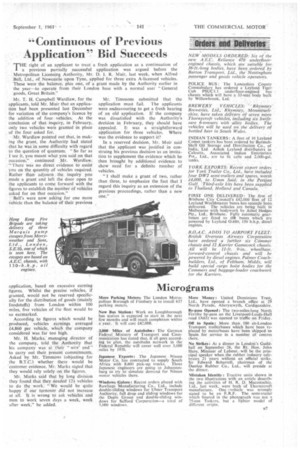"Continuous of Previous Application" Bid Succeeds
Page 41

If you've noticed an error in this article please click here to report it so we can fix it.
THE right of an applicant to treat a fresh application as a continuation of a previous partially successful application was argued before the Metropolitan Licensing Authority, Mr. D. I. R. Maiir, last week, when Alfred Bell, Ltd., of Newcastle upon Tyne, applied for three extra A-licensed vehicles. These were the balance, plus one, of a grant made by the Authority earlier in the year—to operate from their London base with a normal user "General goods, Great Britain."
Mr. T. H. Campbell Wardlaw, for the applicants, told Mr. Muir that an application had been presented last December for variation of the company's licence by the addition of four • vehicles. At the conclusion of that inquiry, in February, only two vehicles were granted in place of the four asked for.
Mr. Wardlaw pointed out that, in making the grant, the Authority had stated that he was in some difficulty with regard to the question of quantum. "So far as I see it, you meant what you said on that occasion," continued Mr. Wardlaw. "-There was no direct evidence to assist you on the quantity of vehicles required. Rather than adjourn _the inquiry you made a grant and left the door open to the applicants to come forward with the figures to establish the number of vehicles asked for on that occasion."
Bell's were now asking for one more vehicle than the balance of their previous application, based on excessive earning figures. Whilst the precise vehicles, if granted, would not be reserved specifically for the distribution of goods (mainly foodstuffs) from London within 100 miles, five vehicles of the fleet would be so earmarked.
According to figures which would be produced, vehicles earnings averaged £4,860 per vehicle, which the company considered was far too high.
Mr. H. Marks, managing director of the company, tOld the Authority that his company was at their "wits' end" to carry out their present commitments. Asked by MT. Timmons (objecting for the B.T.C.) whether there would be customer evidence, Mr. Marks stated that they would rely solely on the figures.
Mr. Marks said that by long division they found that they needed 12+ vehicles to do the work. "We would be quite happy if our turnover did not increase at all. .4 is wrong to ask vehicles and men to work seven days a week, week after week," he added. Mr. Timmons submitted that the application must fail. The applicants were endeavouring to get a fresh hearing of an old application. If the company was dissatisfied with the Authority's decision inFebruary, they should have appealed. It was a straightforward application for three vehicles. Where was the evidence to support it?
In a reserved decision, Mr. Muir said that the applicant was justified in construing his previous decision as an invitation to supplement the evidence which he then brought by additional evidence to show need for a definite number of vehicles.
"I shall make a grant of two, rather than three, to emphasize the fact that I regard this inquiry as an extension of the previous proceedings, rather than a new one.
























































































































